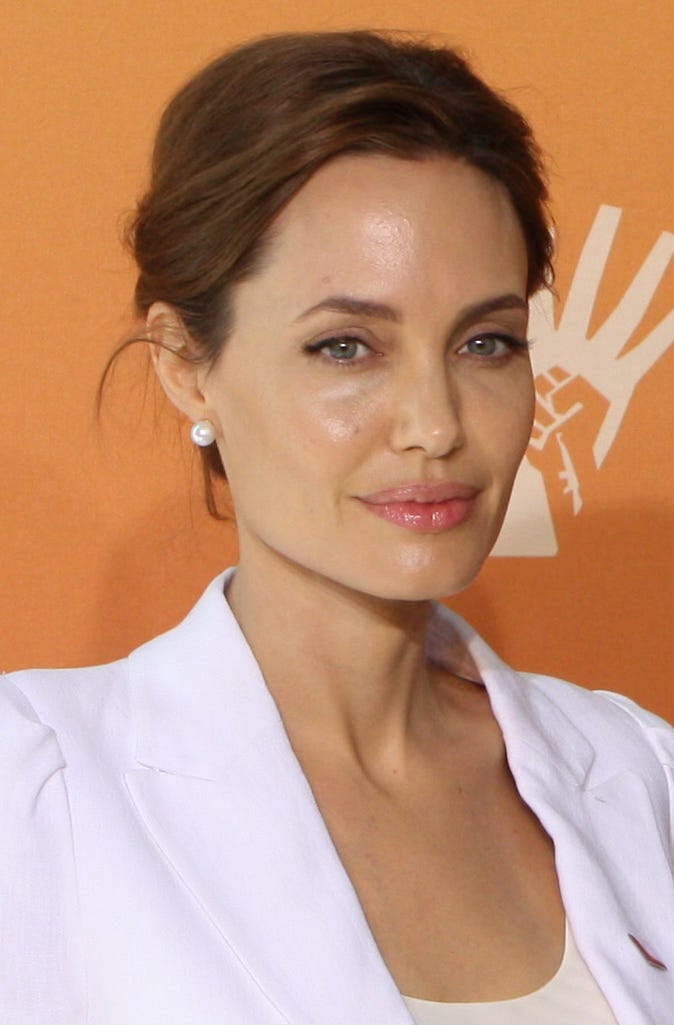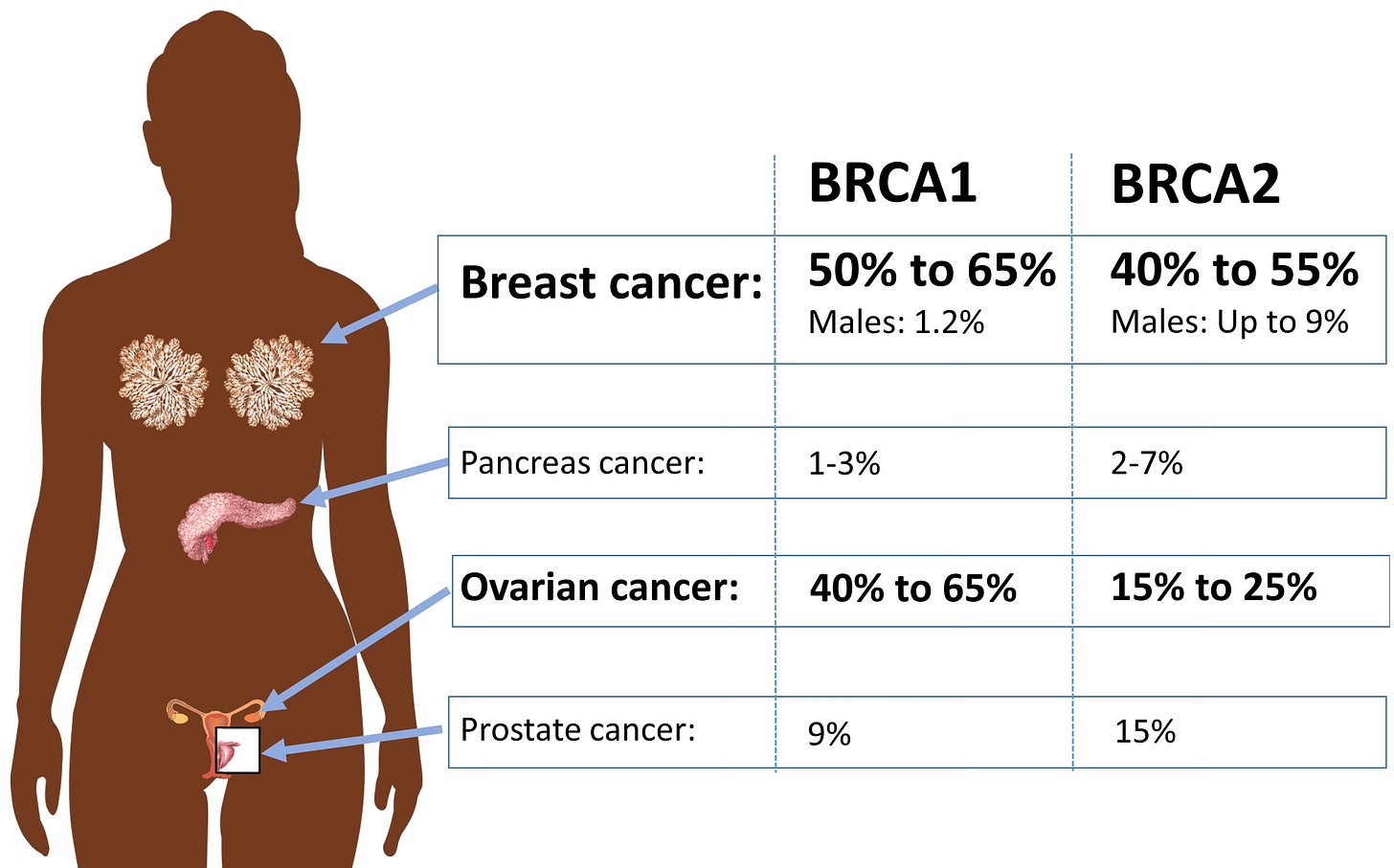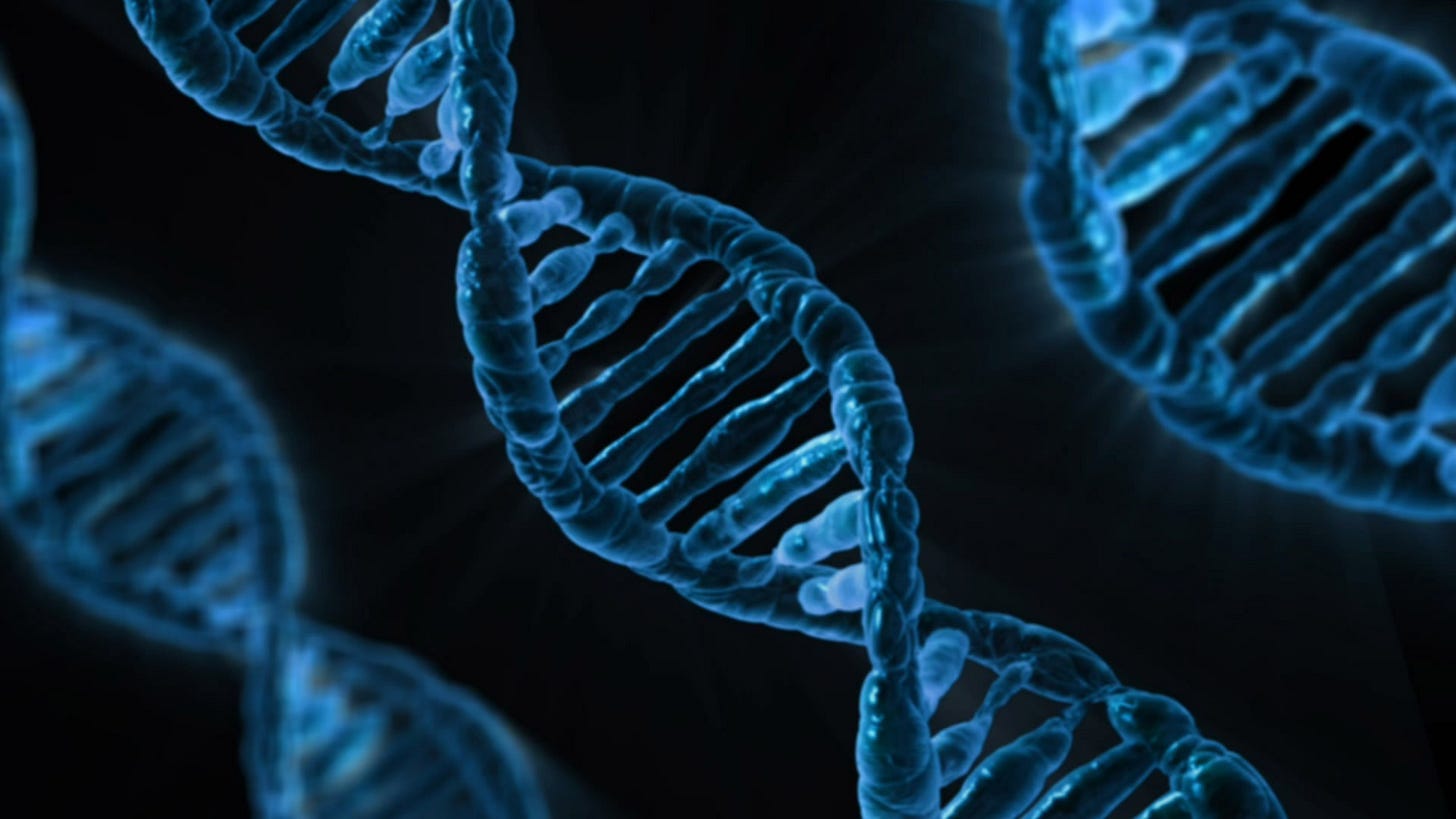The legacy of BRCA1 in our Family
Cousins Mary and Melody tell their stories.
For the past few days I've been talking about a BRCA1 video that I created for my cousins, along with some teaser videos to get their attention. How did I do? I think the jury is still out. I've reached about 35 people. Most are probably cousins, but are they cousins who didn't already know about the BRCA1 variant? I'll continue to watch and assess.
In the meanwhile, the full video is embedded above, I’ve also covered the topic in written format below.
Three Cousins
One knew cancer ran in the family but hoped to outrun it. One had already been through cancer, then found out she had the BRCA1 genetic variant. The third thought she wouldn't have BRCA1 because her dad never had cancer.
We're finally having nice weather in Seattle, and it reminds me of an August day in 2018 when I first heard from my Cousin Melody.
I'm on the bus riding home from work. My phone vibrates. It's a Facebook message. I know who Melody is, but we've never spoken, so this is a fun surprise.
She's been reading some of my dad's stories, and she mentions the family tendency to pass out if you stand up too fast. I do that. Dad did that. She does it. And her mom. We could be a whole pile of passed out people, all just from standing up too fast.
But then she gets to the real reason for contacting me. Her family has a history of breast cancer — her Mom, her Grandma, two sisters, two nieces, and now she has it as well. Triple negative breast cancer. Several family members have gone through genetic testing, and they all have a specific BRCA1 variant.
Melody thinks I should sign up for genetic testing.
Melody's Grandma was my Aunt Sina, Dad's sister. I remember sad stories about Sina dying from cancer at the age of 43, leaving 3 young children behind, but I didn't realize this same cancer was so prevalent in her kids and grandkids. And I don't know much about triple negative breast cancer except that it is very aggressive. I worry it might take Melody away, like it did her Grandma, at about the same age, and with two young children.

The only reason I've even heard of BRCA is because of Angelina Jolie. I read an article in 2013 about how she got some preventative surgery after genetic testing. Back then I chalked this testing up to the things actresses do when they're looking for the next trendy thing to spend money on.
Melody tells me Aunt Sina first noticed her cancer when she found a lump near her armpit. Uncle Clarence wouldn't take her to the doctor because doctors are expensive. Instead he gave her aspirin. Eventually Sina ended up in the hospital, but by then it was too late.
When I get home I pull out my family notes. I've been researching a story about Sina's sister Susie, so this family is fresh on my mind.
Aunt Sina was premature at birth, a small and sickly baby. Around the age of two she came down with meningitis. As a result, she had to learn to walk all over again. I don't know a lot about her health in later life, but in 1918, at the age of 10, she contracted tuberculosis and spent several months in the TB hospital near Joplin, Missouri.
So here I sit in 2018, 100 years later, thinking about Melody and Sina and this new family thing.
Did they inherit the BRCA1 variant from Grandma, or Grandpa?
One month later, cousins Alan and Mary invite us to a Facebook group. Grandma was a Hubbard, and these cousins are descendants of her brother Edmund Hubbard. The Facebook group was named BRCA-1. Now that seemed like an odd coincidence.
Cousins began to tell their stories in this group. Mary discovered her cancer in 2013. She got mixed tests indicating she had carcinoma and angiosarcoma. Angiosarcoma is really nasty stuff. She was told she would be lucky to live 2 years. The specialist at Mayo clinic told her to tell her brain that this cancer was regular carcinoma and could be treated, so ... that's what she did. I guess it worked!
In 2018 Mary and her Uncle Alan began looking more closely at how many of their family members had cancer. After some investigation, they found that genetic tests all pointed to a specific BRCA1 variant.
Mary created a hand-drawn family tree to track who had been tested and who had cancer. The list expanded as more and more cousins reported their status. Nobody knew where the variant originated. But as more people reported, all evidence pointed to either Grandma's brother or his wife. That's when Melody came online and shared her variant number. It was an exact match to all of the other cousins.
Melody was the crucial link.
This variant appears to come from the Hubbards, both Grandma and Grand Uncle Edmund, through one of their parents.
While we were having all these conversations, Melody was going through chemo. Her sister came over and helped her shave her head. She kept working, through the chemo. But then one day at work she didn't look very well. They sent her home, and she fell asleep on the couch. Her sister came by after work and couldn't wake her up. The diagnosis? West Nile Encephalitis.
I found this out from her niece, who told me Melody was in the hospital and added, "We were worried there for a couple of minutes."
Melody says, "Yes, it was not ideal."
The truth is, she almost died.
Melody remembers that cold weather seemed much colder than expected on a bald head, that wigs were too scratchy, and that her mom found her a specific type of stocking cap that was softer than all the others. After several rounds of chemo and six surgeries, she's had enough of hospitals for awhile.
The years passed, and I continued to read my cousins' BRCA stories.

I found out that a person with an elevated predisposition to cancer is called a previvor. I don't know who came up with that term.
I learned that many health insurance plans cover genetic testing, and that if you need to purchase the testing yourself, color.com offers genetic testing for around $260, with occasional sales.
I discovered that the primary concerns with BRCA1 are breast and ovarian cancers, along with some risk of prostate and pancreatic cancer. BRCA2 has some association with several other cancers, including a higher risk of prostate and breast cancer in men. More cancers are being studied.
The cousins posted articles outlining preventative measures for previvors. Women with BRCA mutations can opt for annual mammograms, breast MRIs, preventative medications, and surgeries to remove breasts and ovaries. Men can opt for regular prostate cancer screenings.
I didn't think I needed this test, though, because Dad lived to the age of 88 with no signs of cancer. But then one day I heard about another cousin with BRCA1. She chose to have the recommended preventative surgeries, including a total hysterectomy. They found cancer in her fallopian tubes which, fortunately, they had removed.
According to my doctor, one of the problems with ovarian cancer is that it often starts in these tubes, where it is undetectable, and by the time it spreads to the ovaries it can be very advanced. He says that fallopian tube cancers tend to be aggressive. So this preventative surgery may have saved my cousin's life. After reading about her experience, I decided to go ahead with testing. I checked, and my insurance did cover it.
How often does your medical professional ask you for a family tree?
I went in there armed with Mary's hand drawn tree of all the cousins she knew about so far. The geneticist was impressed. Who wouldn't be?
After testing was complete, they told me to expect an email notifying me of negative results, but that didn't happen. Instead I got a notice asking me to set up an appointment. All the cousins said, yes, if they want to talk to you in person, you probably have something of concern. They were right. My variant? The same as everybody else.
In the follow-up consult, I was told that BRCA1 seems more likely to cause breast cancer in younger women, between the ages of 30 and 40. In the Hubbard clan we see a broad range of ages. Mary was 62 at the time of diagnosis. The oldest cousin we know of was 75. The youngest is 25.
And this is not like the mumps or measles, where you get it once and then you're immune. Melody was told her chances of getting cancer again are about 10%. Even after a preventative mastectomy, one of our cousins still developed cancer in a breast cell that wasn't removed.
After my consult, I decided to get a hysterectomy and to sign up for breast exams every six months. At one exam I have a mammogram, and at the other, an MRI. Each previvor needs to consider personal circumstances when deciding on a care plan.
Do I spend my days worrying about cancer?
Well, no, not really. I'm a professional worrier, so cancer has to get in line behind all the other worries I invent. I think of cancer as something to be smart about, like locking your doors at night and looking both ways before you cross the street.
The biggest worry for me was, did I pass this on to my daughter? And what about my granddaughters? If you have it, you have a 50% chance of passing it on to each child. We got my daughter in for testing as soon as possible, and thank heavens, she does not have the variant. Every time a cousin reports back with news like this, we cheer.
Alan and Mary did this family a great service by herding us into that Facebook group and sending out the alarm. They created an extended support group to provide advice to family previvors, survivors, and those who are currently in the middle of treatment.
Does Mary worry? She says, "I'm not petrified, but I pay attention."
How about Melody? Recently she told me: "At first, I was really, really anxious ... But now I only think about it like really occasionally. I mean you can't let it run your life. You can't let the fear of death stop you from living."
I think there are more cousins descended from both Grandma and her brother who still don’t know about this genetic mutation. It’s a really big family. If you’re a cousin, please, spread the word.
See this page for a complete list of links to source material about BRCA1: bit.ly/BRCA1-Perplexity-Overview
To read more about West Nile Encephalitis, see this page: bit.ly/west-nile-encephalitis



Thank you Cousins Nancy, Mary, and Alan! I love you all.
Thank you for this!